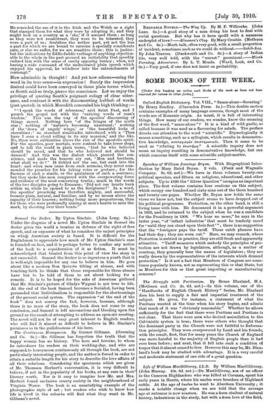Samuel the Seeker. By Upton Sinclair. (John Long. Os.)— Under
the disguise of a novel Mr. Upton Sinclair in Samuel the Seeker gives the world a treatise in defence of the right of free speech, and an exposure of what he considers the unjust principles on whieli American society is based. It is difficult for the Englishman to appreciate how much of Mr. Upton Sinclair's case is founded on fact, and it is perhaps better to confine any notice of the book to a consideration of it as fiction. It must be acknowledged that treated from this point of view the story is not successful. Samuel the Seeker is so ingenious a youth that it is well-nigh impossible-for any one to believe in him. He goes about like a modern Don Quixote tilting at abuses, and with touching faith he thinks that those responsible for these abuses have but to be told of them to set about looking for a remedy. It is to be hoped for the sake of American girlhood that Mr. Sinclair's picture of Gladys Wygant is not true to life. At the end of the book Samuel becomes a Socialist, having been persuaded that Individualism is responsible for the shortcomings of the present social system. The expression "at the end of the book" does not convey the fact, however, because, although there is no more of the story, the book does not come to any conclusion, and Samuel is left unconscious and bleeding upon the ground as the result of attempting to address an open-air meeting. The novel will not be of very great interest to English readers, who will find it almost as difficult to believe in Mr. Sinclair's premisses as in the guilelessness of his hero.






































 Previous page
Previous page